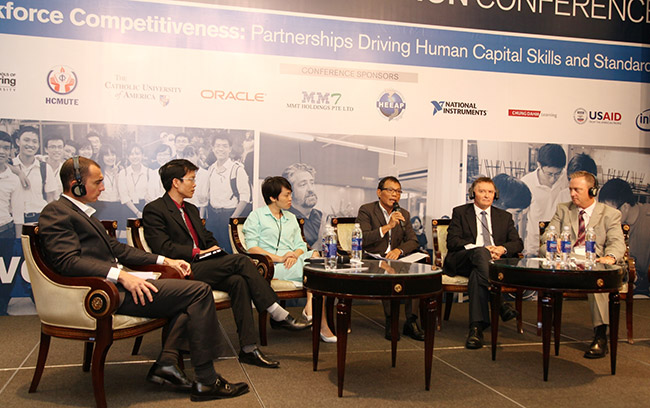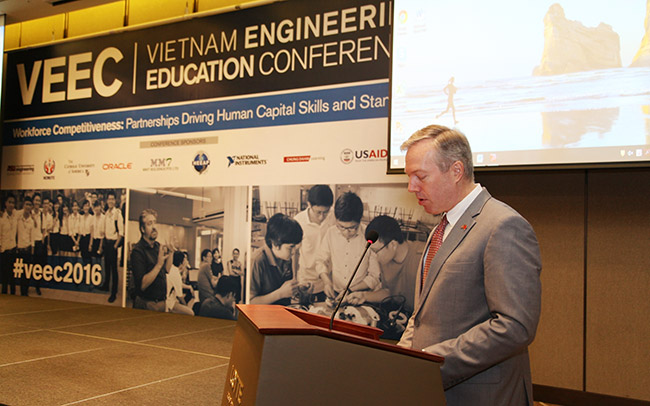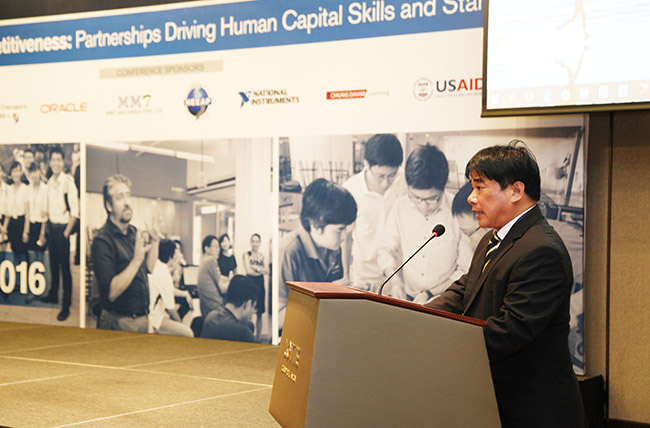Vietnam Engineering Education Conference opens

Founding partners Intel Corporation and Arizona State University (ASU) launched HEEAP in 2010 with funding from the US Agency of International Development (USAID).
The Fourth Annual VEEC conference, held in Ho Chi Minh City, brings together the academic, industry and government communities for two days of interactive plenary sessions, panel discussions, technical sessions and seminars. This year’s focus is workforce competitiveness: Partnerships Driving Human Capital Skills and Standards.
In alignment with the Trans-Pacific Partnership and the Association of Southeast Asian Nations (ASEAN) Economic Community, Vietnam’s academic engineering programmes have begun leveraging public-private alliances to ensure that higher educational systems produce workforce-ready graduates with enhanced skills to innovate in the country’s economy.

“HEEAP has proven to be an outstanding example of the powerful difference that can be made with a strong public-private partnership,” said Sherry Boger, vice president and general manager of Intel Products Vietnam. “ASU has been leading the programme to achieve key objectives and today Intel is hiring quality students who have benefited from the improved instruction, curricula and labs.”
In order to attract additional partnerships, with support from USAID, Intel, National Instruments, Pearson and other sponsors, HEEAP has endeavored to move Vietnam’s top technical universities and vocational schools toward international accreditation, including the Accreditation Board for Engineering and Technology, Inc. (ABET). The Vocational and University Leadership and Innovation Institute (VULII) was launched in 2012 to provide capacity-building programmes within the Vietnamese educational system, from ministry officials and university rectors to administrators, academic and professional staff, and engineering faculty leaders preparing the next generation for the engineering workforce.

“Previously we had strategic goals, but nobody remembers. We imposed those goals from the rector down to staff,” explained Dr. Dao Khanh Du, rector of Cao Thang Technical College. “Now they are developed based on a bottom-up approach. Ownership leads to responsibility, and people start to proactively work towards these strategic goals. It is a big success for us.”
VULII programmes, including workshops and coaching HEEAP and ASU staff, have prepared leadership and faculty to undertake the accreditation process with confidence.
“In 2014, Ho Chi Minh City University of Technology became the first Vietnamese university to receive ABET accreditation recognising two of its programmes,” said Dr. Kathy Wigal, ASU assoc. director for Curricular Innovation, “and many have sought membership in the ASEAN University Network (AUN).”
To date, more than 400 Vietnamese lecturers have trained at ASU and are now preparing graduation-ready students with the applied and technical communication skills required by multinational corporations. Last year, a cohort of instructors from the Vietnam National University – Ho Chi Minh City system visited ASU the first in series of special projects, the Internet of Things (IoT). Additionally, a $500,000 grant from the US Department of State will bring 44 academic fellows — all high-achieving undergraduate students from Southeast Asia — to Tempe, Arizona, to attend two ASU-hosted institutes as part of US President Barack Obama’s signature programme: the Young Southeast Asian Leaders Initiative (YSEALI).
“A number of reforms in this university start from ASU. A concrete example is our establishment of School of Innovation and Entrepreneurship,” said Dr. Do Van Dzung, rector of Ho Chi Minh City University of Technology. “Also, the implementation of online, mobile and blended learning has created a revolution for the teaching and learning culture in the university.”
What the stars mean:
★ Poor ★ ★ Promising ★★★ Good ★★★★ Very good ★★★★★ Exceptional
Latest News
More News
- State corporations poised to drive 2026 growth (February 03, 2026 | 13:58)
- Why high-tech talent will define Vietnam’s growth (February 02, 2026 | 10:47)
- FMCG resilience amid varying storms (February 02, 2026 | 10:00)
- Customs reforms strengthen business confidence, support trade growth (February 01, 2026 | 08:20)
- Vietnam and US to launch sixth trade negotiation round (January 30, 2026 | 15:19)
- Digital publishing emerges as key growth driver in Vietnam (January 30, 2026 | 10:59)
- EVN signs key contract for Tri An hydropower expansion (January 30, 2026 | 10:57)
- Vietnam to lead trade growth in ASEAN (January 29, 2026 | 15:08)
- Carlsberg Vietnam delivers Lunar New Year support in central region (January 28, 2026 | 17:19)
- TikTok penalised $35,000 in Vietnam for consumer protection violations (January 28, 2026 | 17:15)
















 Mobile Version
Mobile Version